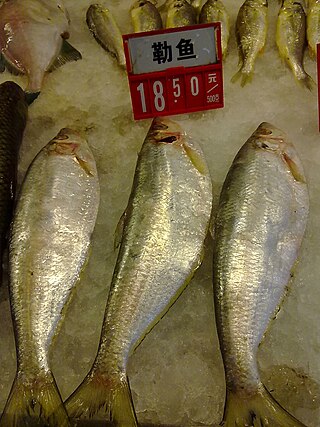
A tuna is a saltwater fish that belongs to the tribe Thunnini, a subgrouping of the Scombridae (mackerel) family. The Thunnini comprise 15 species across five genera, the sizes of which vary greatly, ranging from the bullet tuna up to the Atlantic bluefin tuna, which averages 2 m (6.6 ft) and is believed to live up to 50 years.

Mackerel is a common name applied to a number of different species of pelagic fish, mostly from the family Scombridae. They are found in both temperate and tropical seas, mostly living along the coast or offshore in the oceanic environment.

Herring are various species of forage fish, belonging to the order Clupeiformes.

Pristigasteridae is a family of ray-finned fish related to the herrings, including the genera Ilisha, Pellona, and Pristigaster. One common name for the taxon is longfin herring. The taxonomic classification of this family is in doubt; it was traditionally divided into two subfamilies, Pelloninae and Pristigasterinae, but molecular data indicates that these are not monophyletic.

Sardine and pilchard are common names for various species of small, oily forage fish in the herring suborder Clupeoidei. The term 'sardine' was first used in English during the early 15th century; a somewhat dubious etymology says it comes from the Italian island of Sardinia, around which sardines were once supposedly abundant.

Sprat is the common name applied to a group of forage fish belonging to the genus Sprattus in the family Clupeidae. The term also is applied to a number of other small sprat-like forage fish. Like most forage fishes, sprats are highly active, small, oily fish. They travel in large schools with other fish and swim continuously throughout the day.

The ilish, also known as the ilishi, hilsa, hilsa herring or hilsa shad, is a species of fish related to the herring, in the family Clupeidae. It is a very popular and sought-after food in the Bengal region, and is the national fish of Bangladesh and state fish of the Indian state of West Bengal.

Megaloptera is an order of insects. It contains the alderflies, dobsonflies and fishflies, and there are about 300 known species.

The starry sturgeon, also known as the stellate sturgeon or sevruga, is a species of sturgeon. It is native to the Black, Azov, Caspian and Aegean sea basins, but it has been extirpated from the last and it is predicted that the remaining natural population will follow soon due to overfishing.

Tenualosa is a genus of ray-finned fish belonging to the family Dorosomatidae, which also includes the gizzard shads and sardinellas. These fishes are found in rivers, brackish waters and coasts in the Indo-Pacific region.

The toli shad or Chinese herring is a fish of the family Clupeidae, a species of shad distributed in the western Indian Ocean and the Bay of Bengal to the Java Sea and the South China Sea. It may be found in Mauritius and the Cambodian Mekong near the Vietnam border. It inhabits fast-flowing, turbid estuaries and adjacent coastal waters.

An anchovy is a small, common forage fish of the family Engraulidae. Most species are found in marine waters, but several will enter brackish water, and some in South America are restricted to fresh water.

Ilisha africana, called the West African ilisha, is a species of longfin herring native to the coasts, lagoons and estuaries of western Africa from Senegal to Angola. It prefers shallow waters, and is unlikely to be found below 25 m. Some individuals can reach 30 cm, with the average closer to 18 cm.

Ilisha is a genus of ray-finned fishes in the family Pristigasteridae. The genus contains 16 species. It is similar to Pellona but lacks a toothed hypo-maxilla. The genus has a worldwide distribution in tropical and subtropical coastal waters and estuaries. Some species also enter rivers, and I. amazonica and I. novacula are largely–if not entirely–restricted to tropical rivers.
Lonchogenys ilisha is a species of characin found in the Rio Negro in Brazil and Colombia. It is the only member of its genus.

The elongate ilisha, also known as the Chinese herring or slender shad, is a species of longfin herring native to the coastal waters and estuaries of North Indian Ocean and Northwest Pacific. It is a relatively large species, up to 45–60 centimetres (18–24 in) in total length. It is an important fishery species.
Patricia J. Kailola is a noted ichthyologist. Her primary focus is in tropical Indo-Pacific fishes. She has worked in the Marine Studies program at the University of the South Pacific since 1995 and is an Australian Museum Research Associate. Among her numerous publications are listed several books covering tropical fish. She also has written texts on catfish. As of April 2006, she was working on a textbook on Western Indian Ocean fishes. She has assisted the Australian Museum in confirmation of species identification among their collection. Worldcat.org lists 27 works in 57 publications in 1 language and 603 library holdings.
















